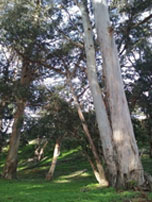SHAHEED KARTAR SINGH SARABHA AYURVEDIC MEDICAL COLLEGE & HOSPITAL
Affiliated to Guru Ravidas Ayurved University, Hoshiarpur Punjab
Affiliated to Guru Ravidas Ayurved University, Hoshiarpur Punjab

Botanical Name : Eucalyptus globules Labill.
Family : Myrtaceae
Introduction :
Myctaceae (Held sacred to Venus)
Latin name: Eucalyptus – eu = good, kalypto = conceal, the calyx which covers the flowers, falls off like a cap. All with white flowers; citriodoracitrus = lemon, odor smell
Scientific classification: The genus Eucalyptus belongs to the family Myrtaceae. The mountain ash is classified as Eucalyptus regnans, the blue gum as Eucalyptus globulus, and the cider gum as Eucalyptus gunnii. Black peppermint is classified as Eucalyptus amygdalina and Sydney peppermint as Eucalyptus piperata
Eucalyptus, genus of trees and some shrubs of the myrtle family. This genus, which includes over 800 species, forms the preponderant vegetation and most valuable timber trees of western Australian forests. Eucalyptus trees are characterized by leathery, whitish leaves that hang vertically, their edges facing the sun, and their ragged bark and peculiar aroma. Some trees in the genus are among the tallest trees known. One specimen of mountain ash with a height of at least 97 m (at least 318 ft) was found near Melbourne, Australia.
Many species are known as gum trees because of their resinous exudations. Among these are the blue gum and the cider gum, the lumber of which is widely used. Other species are known as stringybarks because of their fibrous inner bark. The peppermint trees, black peppermint and Sydney peppermint, are also included in this group. The ironbarks have hard gray bark and yield good timber. Botany Bay kino, a dark red, odorless gum employed as an astringent and a hemostatic drug and for tanning and dyeing, is derived from the ironbarks. The bloodwoods have reddish wood and also yield Botany Bay kino. Dragon’s blood, tannin, oils, dyes, tars, and acids are yielded by other species of eucalyptus.
Names in different Indian languages :
English : Blue-Gum tree, Australian Gum tree, eucalypt
Hindi : Yukeliptas
Malayalam : Yukkalimaram
Sanskrit : Tailaparna,nilaniryasa
Tamil : Yukkalimaram
Unani : Neelgiri oil
Synonyms :
Tilaparna, Tailaparna, Sugandhapatra, Haritaparna Neelaniryaasa, Tribhandi, Triputaa, Saralaa, Suvahaa, Rechani, Nishotraa
Morphology :
The tree rapidly achieves a good height. The trunk is straight and long. Leaves – oblong and emit a pleasant odour on crushing.
Its wood is used for railway tract sleepers and paper pulp
Distribution & Habitat :
Australia (originally), now found in India, hills and mountains of Nilgiri, gardens
Chemical constituents :
Oil contains eucalyptol 50 – 60%. Mites do not attack the tree , cineole, acyl-phloroglucinolmonoterpene
Properties :
Guna : laghu, singdha, tikshna;
Rasa : katu, tikta, kashaya;
Vipaka : katu,
Virya : ushna;
Dosha : kaphavatashamak.
Karma :
Deepana, pachana, hridya, mutrala, jwaraghna
antiseptic, antibiotic, antiviral, antifungal, antispasmodic, decongestant, antiasthmatic, expectorant, antirheumatic, diaphoretic
Indication :
Jwara, puyameha, agnimanda, swasa, kasa, peenasa, vatiroga
bronchitis, migraine, congestive headache, neuralgia
Part used :
Leaves, root, oil
Dosage :
Leaf juice 10-15 ml
Powder 2-4 g
Decoction 50-100 ml
External uses :
Old, preserved oil is useful in pyogenic infections. It is used to prepare ointments.
Mixture of eucalyptus oil and mustard oil is used in osteoarthritis. Inhalation of oil in hot water vapours is useful in various lung conditions. Its analgesic property is useful in headache. body ache and neuropathy. Enema of oil and water is useful in thread worms.
Internal uses :
In small doses, it is a cardio stimulant but in large dose causes cardiac arrest. Oil is useful in loss of appetite and flatulence. Enema of the oil is given in worms. Gum is used in diarrhoea, dysentery and lung infections. Oil is useful in cystitis and chronic pyuria.
